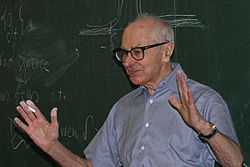Serge Lang: Difference between revisions
imported>Giovanni Antonio DiMatteo (grammatical edits) |
imported>Louise Valmoria m ({{subpages}}) |
||
| Line 1: | Line 1: | ||
{{subpages}} | |||
[[Image:Serge_Lang-2004.jpg|thumb|250px|Serge Lang (1927-2005)]] | [[Image:Serge_Lang-2004.jpg|thumb|250px|Serge Lang (1927-2005)]] | ||
'''Serge Lang''' ([[May 19]], [[1927]] – [[September 12]], [[2005]]) was a French-born American mathematician. He was primarily known for his work in [[number theory]], his mathematical textbooks, especially ''Algebra'', and his political activism. He was a member of the [[Bourbaki]] group. | '''Serge Lang''' ([[May 19]], [[1927]] – [[September 12]], [[2005]]) was a French-born American mathematician. He was primarily known for his work in [[number theory]], his mathematical textbooks, especially ''Algebra'', and his political activism. He was a member of the [[Bourbaki]] group. | ||
Revision as of 13:08, 6 December 2007
Serge Lang (May 19, 1927 – September 12, 2005) was a French-born American mathematician. He was primarily known for his work in number theory, his mathematical textbooks, especially Algebra, and his political activism. He was a member of the Bourbaki group.
He was born in Paris in 1927, and moved with his family to California as a teenager, where he graduated in 1943 from Beverly Hills High School. He subsequently graduated from Caltech in 1946, and received a doctorate from Princeton University in 1951. He had positions at the University of Chicago and Columbia University (from 1955, leaving in 1971 in a dispute). At the time of his death he was professor emeritus of mathematics at Yale University.
Mathematical work
He was a student of Emil Artin at Princeton University. His thesis was on quasi-algebraic closure. He then worked on the geometric analogues of class field theory and diophantine geometry. Later he moved into diophantine approximation and transcendence theory.
A break in research while he was involved in trying to meet 1960s student activism half way caused him (by his own description) difficulties in picking up the threads afterwards. He wrote on modular forms and modular units, the idea of a 'distribution' on a profinite group, and value distribution theory.
He made a number of conjectures in diophantine geometry: Mordell-Lang conjecture, Bombieri-Lang conjecture, Lang's integral point conjecture, Lang-Trotter conjecture, Lang conjecture on Gamma values, Lang conjecture on analytically hyperbolic varieties.
Books
He was a prolific writer of mathematical texts, often completing one on his summer vacation. Most are at graduate level and aimed at those intending research in number theory. He wrote calculus texts and also prepared a book on group cohomology for Bourbaki.
Lang's Algebra, a graduate-level introduction to abstract algebra, was a highly influential text that ran through numerous updated editions. His Steele prize citation stated, "Lang's Algebra changed the way graduate algebra is taught...It has affected all subsequent graduate-level algebra books." It contained ideas of his teacher, Artin; some of the most interesting passages in Algebraic Number Theory also reflect Artin's influence and ideas that might otherwise not have been published in that or any form.
In Lang's obituary article in the Yale Daily News, colleague Peter Jones said that Lang's work is believed to have surpassed the record total output of Leonhard Euler, a prolific 18th century mathematician. [1]
Awards as expositor
Lang was noted for his eagerness for contact with students. Many of his students at Yale considered him to be one of the greatest teachers of mathematics in the world. He won a Leroy P. Steele Prize for Mathematical Exposition (1999) from the American Mathematical Society. In 1960, he won the sixth Frank Nelson Cole Prize in Algebra for his paper Unramified class field theory over function fields in several variables (Annals of Mathematics, Series 2, volume 64 (1956), pp. 285-325).
Activism
In addition to being a mathematician, Lang spent much of his time engaged in politics. He was active in opposition to the Vietnam War. He volunteered in the 1966 anti-war campaign of Robert Scheer (and later wrote a book about it entitled The Scheer Campaign). He later quit his position at Columbia in 1971 over the university's treatment of anti-war protesters.
He was also engaged in several "whistle blowing" crusades to challenge anyone he believed was spreading misinformation or misusing science or mathematics to further their own goals.
He attacked the 1977 Survey of the American Professoriate, an opinion questionnaire that Seymour Martin Lipset and E. C. Ladd had sent to thousands of college professors in the United States, accusing it of containing numerous biased and loaded questions. This led to a public and highly acrimonious conflict.
In 1986, he challenged the nomination of political scientist Samuel P. Huntington to the National Academy of Sciences, claiming that his research consisted of "political opinions masquerading as science". The challenge was successful.
Lang kept his political correspondence and related documentation in extensive "files". He would send letters or publish articles, wait for responses, engage the writers in further correspondences, collect all these writings together and point out what he considered contradictions. He often mailed these files to people he considered important; some of them were also published in his books Challenges (ISBN 0-387-94861-9) and The File (ISBN 0-387-90607-X). His extensive file on the Baltimore affair of alleged scientific misconduct was published in the journal Ethics and Behaviour in January 1993 [2].
His most controversial political stance was as an AIDS dissident; he maintained that the prevailing scientific consensus that HIV causes AIDS has not been backed up by reliable scientific research, yet for political/commercial reasons further research questioning the current point of view is suppressed. In public he was very outspoken about this point and a portion of Challenges is devoted to this issue.
Later in his life, Lang expanded his "challenges" to include the humanities. For example, he fought the decision by Yale University to hire Daniel Kevles, a historian of science, because he disagreed with Kevles' book The Baltimore Case.
